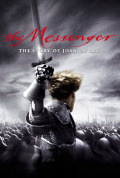
Directed by
Luc Besson
148 minutes
Rated M
Reviewed by
Bernard Hemingway

Joan of Arc: The Messenger
Kathryn Bigelow was originally slated to direct this film but pulled out when co-producer Luc Besson insisted that his then wife, Milla Jovovich (she had starred in his previous film, The Fifth Element), should play the maid from Orleans. With Bigelow at the helm and her choice of Sinéad O'Connor as Joan of Arc (and Sean Connery as The Conscience) this might have been an interesting project but as it turned out there is a horrible mismatch between Besson’s characteristic fondness for meretricious spectacle and the story of a simple peasant girl who briefly was instrumental in the Hundred Years war between France and the English.
Presumably the film was made in English in order to reach a wider market but the casting which has resulted is, like much of the film. borderline laughable and certainly deprives the film of any conviction. Jovovich, whose hair goes through a number of changes from luxuriant tresses to dungeon tousled throughout, would be appropriate to the pages of Vogue but is hardly credible as a religiously-inspired peasant girl, let alone throwing (conspicuously helmet-free) her weight around on the battlefields of medieval France and screaming at her commanders. As for John Malkovich as the precious Dauphin of France and Faye Dunaway as the Dauphin’s domineering mother-in-law Yolande d'Aragon, both of whom sport ‘dos you can't take your eyes off, why? (Toby Jones also appears in a small role as an English judge).
The script by Besson with Andrew Birkin (brother to Jane), who appears as Talbot the English occupier of Orleans, whilst being historically informative is simply awful in its attempts to bring the story to a modern ausience, leading to clangers such as in a scene early in the piece when an English soldier brutally rapes and murders Joan’s older sister (a completely fabricated incident as far as I am aware) and cries out “Now that’s what I call booty”. The nadir however must be the response to Joan’s letter to the English invaders inviting them to surrender. One of the English commanders leans out over a parapet and yells to Joan: “Go F**K yourself”. Dear me.
Watching the film one feels like Roland Barthes checking off the signifiers of Medievalism - the cavernous, crenellated castles, the clanking armour, the tonsured monks, the overfed priests, the whispering self-serving court flunkies, and so on – none of which coalesce into a remotely convincing whole.
The only aspect of interest occurs in the film’s final act when a virtually unrecognizable Dustin Hoffman (one can’t help but think, a better choice than Connery), appears as Joan's rational, doubting self, effectively presenting a modern psychological interpretation of her mental state.
The story of Jeanne D’Arc is a tragic one of cruel betrayal and lost innocence. What it deserves is a telling that reflects its mythic, spiritual dimensions, not one that pounds it into florid historical fare complete with grisly, blood-spurting battle sequences. Carl Dreyer in The Passion of Joan of Arc (1928) and Robert Bresson in The Trial of Joan Of Arc (1962) both managed to do justice to their subject matter by confining themselves to Joan’s final days. Which is not to say that the whole story could not be well told but evidently Besson was not the person to do it.
Want something different?





